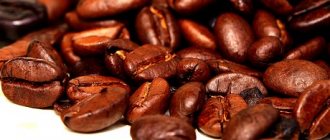Adding sugar to drinks increases the total calorie content of foods, causes an increase in blood glucose levels and leads to the deposition of fat mass. To get rid of the negative consequences, many people prefer to drink coffee without sugar. This only increases the benefits of the drink, but some believe that its taste worsens.
Is it healthy to drink coffee without sugar?
Caffeine stimulates the nervous system, increases the tone of skeletal muscles and improves the psycho-emotional state. Under the influence of the active substance, the work of the heart muscle accelerates, which increases blood pressure. Coffee stimulates the central nervous system, increasing cognitive function due to improved blood supply to neurons. Caffeine increases a person’s performance and motor activity, sharpens attention and reflexes.
Caffeine has the following effects on the body:
- Suppresses the activity of carcinogenic substances. As a result, the risk of developing malignant tumors is reduced and the likelihood of cancerous degeneration of cells decreases.
- The condition of the circulatory system improves, the elasticity of the vascular walls increases. As a result, the development of atherosclerosis slows down and cholesterol plaques stop forming.
- Thanks to its tonic effect, coffee helps reduce the likelihood of diseases of the musculoskeletal system and neurological disorders: Parkinson's disease, Alzheimer's disease, muscular dystrophy.
- Caffeine has a positive effect on the reproductive system. In men, blood supply to the genital organs improves, the risk of erectile dysfunction decreases, and sperm motility improves. In women, the tone of the uterus increases.
(Dzen promotional code when ordering or Zen code word to the operator)
Bread and bran
Grocery
Confectionery
Products under our brands
Can pregnant women drink coffee?
During pregnancy and lactation, women should refrain from drinking the aromatic drink. Firstly, due to impaired absorption of calcium, which is especially important for the formation of a child’s bones. Secondly, due to the risk of reducing the weight of the fetus and increasing its gestation period. Also, expectant mothers should avoid other caffeine-containing products.
Is this coffee harmful?
Despite a number of positive functions, the effect of caffeine stops after 3-4 hours. After this time, the person stops feeling cheerful. The body's resources are depleted, chronic fatigue occurs, and performance decreases. With constant consumption of large amounts of caffeine, there is a risk of developing nerve fiber dystrophy. In addition, the tonic drink is slightly addictive.
Caffeine interferes with the absorption of the following microelements and washes them out of the body:
- calcium;
- potassium;
- magnesium;
- sodium.
Coffee can worsen the dynamics of psychological disorders and cause exacerbation of schizophrenia and manic depression. When drinking a large amount of coffee, excitability increases: a person becomes aggressive.
It is strictly forbidden to drink the drink if you have chronic diseases of the nervous system, cardiovascular pathologies and ulcerative-erosive lesions of the gastrointestinal tract.
Which water to choose: experiment
To test whether high magnesium content really makes coffee sweeter, I made drinks using bottled water. I selected samples with approximately the same mineralization and pH level, but different magnesium content. An important point is that the Mg content on the packaging is usually indicated in a range. Therefore, parameters may be unstable and vary from bottle to bottle. This is worth remembering.
For the experiment, I took coffee from Brazil with a neutral profile, medium acidity and bitterness. I brewed it in a Hario V60 funnel according to the standard recipe - 15 g of coffee per 250 g of water. Water was poured in pulses - 5 injections of 50 g every 30 seconds. Total brewing time 2:45 - 3:00 minutes.
I shared the results below. To fully evaluate the taste of coffee, I concentrated on the sweetness of the drink, but also took into account the overall impression of the result.
| Brand name | Magnesium content (Mg) (mg/l) | pH | Total mineralization (mg/l) | Sweetness | General impression |
| Uvinskaya pearl | less than 10 | 6,5 | 40-100 | mild | empty, flat taste |
| Pilgrim | 0-20 | 6,5 | 100-300 | medium sweetness | full, balanced taste |
| Kubay | 0-20 | 6,5 | 100-300 | mild | unbalanced, with unpleasant sourness |
| Holy spring | 0,5-50 | 5,5-6,5 | 50-100 | bright sweetness | full, balanced taste |
| Societe Minerale | 3-50 | 4,5-7 | 50-500 | medium sweetness | the taste is flat, with unpleasant sourness |
| Red price | 60 | 4,5-9,5 | 50-100 | medium sweetness | bitter taste, unbalanced |
According to my results, the sweetness of coffee in drinks brewed with different waters differed, but not significantly. I expected more from the water with the highest level of magnesium - “Red Price”, but the taste was rather flat, with a preponderance of bitterness and was overall disappointing. I also do not recommend using the “Uvinskaya Pearl” - Mg in it is less than 10 mg/l, and the drink seemed uninteresting. I liked the coffee at the “Holy Source” most of all - the sweetness appeared brighter than in other cups, and the overall impression of the coffee was a drinkable, rich drink, balanced in sourness and bitterness.
Try to conduct a similar experiment yourself, you may get different results. Firstly, experience alone is not enough to draw conclusions, and secondly, taste is always a subjective assessment.
How to give up sugar
First you need to suppress your aversion to the bitter drink. If you feel nauseous when drinking coffee or don’t want to drink it, you don’t need to force yourself to do it. Otherwise, it is recommended to retain the liquid on the surface of the tongue. You should drink the drink slowly, concentrating on the taste sensations.
Gradually you will realize that coffee gives off not only tart and bitter notes. It is recommended to try different types of coffee for comparison:
- Asiatic;
- Arab;
- African;
- South American;
- highland varieties.
You may notice that some types of drink additionally have chocolate and fruity notes or a sour taste.
The taste of the drink directly depends on the method of its preparation, so when adapting to a new product, you should experiment with brewing or roasting coffee beans.
For some, the aroma of the drink plays an important role. In such a situation, you should focus on the smell before tasting. On average, people get used to unsweetened coffee within 3-4 days after drinking it regularly in the morning.
What kind of coffee do you drink?
With sugar
Sugarless
Almond milk
Many coffee lovers prefer to add milk to their coffee to make it tastier. Almond milk can be an excellent alternative to milk from cows. Not only is it healthy, it is also particularly nutritious and tastes great. To prepare it, pour a glass of almonds with a glass of water and leave it overnight, and the next day three glasses of water are added there, and everything is whipped with a blender. Then the mass is filtered through cheesecloth or a sieve. This milk can be stored for no more than five days in the refrigerator.
Calorie content of unsweetened coffee
| Drink | Portion, ml | Calories per serving |
| Ristretto | 15 | 1 |
| Espresso | 30 | 2 |
| Americano | 180 | 2,2 |
| Cappuccino | 180 | 210 |
| Americano double | 240 | 4,4 |
| Filter coffee in a drip coffee maker (regular) | 220 | 2 |
| Filter coffee in Chemex | 240 | 3 |
| Filter coffee in an AeroPress | 220 | 3,5 |
| Filter coffee in French press | 200 | 4 |
| Coffee brewed with cold water | 240 | 6 |
| Latte | 180 | 62 |
| Coffee with milk | 250 | 27 |
| In Turkish, in cezve | 200 | 4 |
| Soluble granular | 200 | 12 |
| Coffee with cream | 250 | 40 |
| Mochaccino | 250 | 290 |
| Soluble freeze-dried | 200 | 24 |
| Chicory | 240 | 46 |
| Glasse | 180 | 125 |
| Green coffee | 220 | 0 |
| Decaffeinated coffee | 220 | 5 |
How does magnesium affect the taste of coffee?
As you know, good water should be clear, clean, colorless and odorless. But this is not enough for coffee. The two main parameters are pH (the balance between acidity and alkalinity) and TDS (the amount of salts dissolved in water). The optimal pH is from 6.5 to 7.5, and TDS is from 50 to 125 mg/l.
What role does Mg play? Its ions are responsible for extraction and help extract more flavor from the beans. How this happens: the main components of coffee - malic, citric and lactic acids - bind to magnesium ions during brewing. Moreover, it is stronger than with calcium ions, another important element in the composition of water. Therefore, the more magnesium in the water, the fruitier and sweeter the drink will be. You can read more about this in a study by physicist Christopher Handon and roasters Leslie and Maxwell Colonna-Dashwood.
So, what you should remember is that if the water has a suitable pH level and general mineralization is normal, but the coffee is still not sweet enough, you should pay attention to the magnesium content in it. The optimal indicator should be at least 30 mg/l.
I decided to test the effect of magnesium on the sweetness of coffee experimentally and conducted an experiment. I talk about the results below.
Coffee without sugar for weight loss
When glucose enters the body, the nutrient is quickly absorbed in the small intestine. As a result, blood sugar levels rise and a feeling of fullness occurs. After drinking coffee without adding granulated sugar, a similar phenomenon is observed. Moreover, after 1 cup of a tart drink, the body receives only a few calories. A person feels falsely full due to the fat-burning properties of caffeine.
The active substance in coffee beans stimulates the breakdown of fat deposits in the subcutaneous tissue and activates the breakdown of glycogen in the liver and skeletal muscles. The latter is formed in hepatocytes from glucose and other simple carbohydrates. Therefore, after its breakdown, a large amount of sugar is released into the blood. To regulate glucose concentrations, the pancreas begins to actively produce insulin.
When the islets of Langerhans are activated, sensory neurons transmit information to the brain about high blood sugar levels. As a result, the excitability of the food center decreases, appetite decreases, and the process of weight loss occurs.
Nutritionists do not object to the use of this method of combating excess weight, but they do not recommend drinking coffee without sugar after meals. Under the influence of caffeine, metabolic processes in the body are accelerated, which is why the digestion process is 40% faster. Under such conditions, nutrients are less well absorbed, which can cause disruption of the functioning of internal organs. In addition, the feeling of fullness occurs for a short time. Within an hour, a person will want to eat again, which can provoke a breakdown during weight loss.
In the fight against excess weight, green coffee is drunk in the form of capsules. The medicine contains an extract of sprouted coffee beans with a high concentration of chlorogenic acid. The active compound stimulates the breakdown of fat masses, which helps accelerate weight loss while following a low-calorie diet.
Adding spices to a drink when losing weight is not prohibited. 1 g of dried ginger root or cinnamon increases the nutritional value of the product by 2.5-3.5 kcal.
How to switch to coffee without sugar and why you need it
Why do we like coffee with sugar?
It's all about subconscious attitudes.
We perceive sweets as nourishing and healthy (in nature, ripe fruits, honey, and nuts have a sweet taste), and bitter and sour as low-nutritive or even potentially dangerous (poisonous plants). Coffee, on the other hand, most often has a pronounced bitterish and sour taste, which our receptors automatically read as “inappropriate.” That is why it is calmer and more pleasant for us to “hide” this bitterness under a sweet taste. It is noteworthy that, when added to coffee, sugar does not camouflage the bitterness, but neutralizes it in a certain way. This interesting process is called dimerization and is the “sticking” of caffeine molecules to each other under the influence of a chemical reaction.
As a result, they seem to play hide and seek with our taste buds - we taste only half the bitterness that we would feel if we did not add sugar, because the caffeine molecules, glued together, have a smaller area of influence on our taste buds.
Why do we like coffee without sugar?
You may have already heard about coffee descriptors, but if not, read on.
Descriptor is a unit of description of the taste and aroma that coffee has. And here everything is much broader than just “sour”, “bitter” or “sweet”. In 1995, q-graders from all over the world adopted a unified system that allows them to most fully describe the flavor and aroma qualities of coffee using the so-called flavor wheel. This circular table contains all the most frequently occurring notes that can characterize this drink. There are, for example, “smoky”, “latex”, “dark green” and “grapefruit” and about a hundred others. Their formation is influenced by several factors - the degree of roasting, the method of processing the grain, the type of coffee, and terroir. And you can learn to distinguish all these flavor shades! The first step to such a deep understanding of coffee is participation in cuppings, which are often even free.
With sugar, you will not be able to catch such subtle nuances - it drowns out all the most valuable shades. And they are worth it, really! This is a completely different level of love for coffee.
How to switch to coffee WITHOUT sugar?
Strengthening cognitive abilities is, of course, great, but this phenomenon is not always more important than health. Many of us have to monitor the amount of carbohydrates that enter our body. So, even if you like your coffee sweet despite all the above, it may be worth starting the slow journey of moving from two spoons of sugar to a “clean” drink with no additives.
It's not as difficult as it seems at first glance. It is not at all necessary to completely deny yourself sweets right away; it is enough to slightly reduce the amount of sugar that you put in your cup of coffee. A gradual reduction in the usual “dose” of sweets will help you smoothly move to a new level of perception, when sugar really seems unnecessary to you. And yes, then you will be surprised to discover that the taste of coffee is much richer than it previously seemed.
To wean off sugar, experts recommend choosing
Brazilian coffee varieties that have less acidity.
It is very convenient to start this transition with milk-based coffee drinks, for example, latte or cappuccino: due to the lactose (milk sugar) content, they will not seem as deadly bitter as espresso or Americano. And when you get into the habit of drinking cappuccino without sugar, it will be much easier to feel all the charm of other types of coffee. This is the truth, supported by personal experience.
Why you shouldn’t drink coffee and why it’s harmful for various diseases
Not only expectant and young mothers, but also people who have a number of diseases should treat this aromatic drink with caution.
Digestive system
Drinking the drink stimulates the production of gastric juice. For people who do not have diseases associated with the gastrointestinal tract, this is not dangerous, but people with diseases such as gastritis, ulcers and pancreatitis should minimize the amount of consumption of this drink. Many scientists claim that regular drinking reduces the risk of liver cirrhosis in people who abuse alcohol. The grains contain a large amount of tannins, which stimulate the metabolism of vitamins C and PP, but inhibit the absorption of iron and calcium.
Heart and vascular system
Caffeine contained in beans stimulates increased contractions of the heart muscle, causing tachycardia. For healthy people, this effect does not have a negative impact; for athletes it is even useful - blood flows to the tissues, muscle regeneration increases. For people prone to developing cardiovascular diseases, tachycardia can cause complications. Such as a hypertensive crisis in hypertensive diseases or a lack of oxygen in the heart muscle in people with heart failure. Excessive caffeine consumption can cause arrhythmia and heart attack in people with coronary heart disease.
Oncological diseases
Finding an answer to the question of how coffee acts on the body in the presence of cancer has worried a large number of medical workers. After numerous scientific studies, the relationship was not confirmed. That is, the drink cannot cause various cancer pathologies. According to some studies, it has been proven that antioxidants found in grains of the product have a positive anti-carcinogenic effect on the body.











